Related Research Articles

Hogmanay is the Scots word for the last day of the old year and is synonymous with the celebration of the New Year in the Scottish manner. It is normally followed by further celebration on the morning of New Year's Day and, in some cases, 2 January—a Scottish bank holiday. In a few contexts, the word Hogmanay is used more loosely to describe the entire period consisting of the last few days of the old year and the first few days of the new year. For instance, not all events held under the banner of Edinburgh's Hogmanay take place on 31 December.

Presbyterianism is a part of the Reformed (Calvinist) tradition within Protestantism that broke from the Roman Catholic Church. Presbyterian churches derive their name from the presbyterian form of church government by representative assemblies of elders. Many Reformed churches are organised this way, but the word Presbyterian, when capitalized, is often applied to churches that trace their roots to the Church of Scotland or to English Dissenter groups that formed during the English Civil War.

A wedding is a ceremony where two people are united in marriage. Wedding traditions and customs vary greatly between cultures, ethnic groups, races, religions, denominations, countries, social classes, and sexual orientations. Most wedding ceremonies involve an exchange of marriage vows by a couple, presentation of a gift, and a public proclamation of marriage by an authority figure or celebrant. Special wedding garments are often worn, and the ceremony is sometimes followed by a wedding reception. Music, poetry, prayers, or readings from religious texts or literature are also commonly incorporated into the ceremony, as well as superstitious customs.
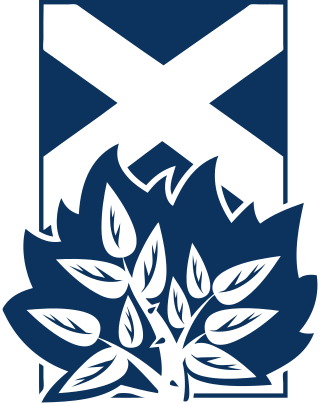
The Church of Scotland is the national church in Scotland, and one of the country's largest, with over 270,000 members. According to the government Scottish Household Survey in 2019, 20% of the Scottish population identified the Church of Scotland as their religious identity. The Church of Scotland's governing system is presbyterian in its approach, therefore, no one individual or group within the church has more or less influence over church matters. There is no one person who acts as the head of faith, as the church believes that role is the "Lord God's".

Tartan is a patterned cloth with crossing horizontal and vertical bands in multiple colours, forming simple or complex rectangular patterns. Tartans originated in woven wool, but are now made in other materials. Tartan is particularly associated with Scotland, and Scottish kilts almost always have tartan patterns. The earliest surviving samples of tartan-style cloth are around 3,000 years old and were discovered in Xinjiang, China.
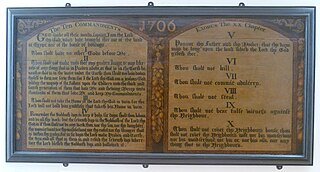
Kirk is a Scottish and former Northern English word meaning 'church'. The term the Kirk is often used informally to refer specifically to the Church of Scotland, the Scottish national church which developed from the 16th-century Reformation. Many place names and personal names are derived from kirk.

Highland games are events held in spring and summer in Scotland and other countries with a large Scottish diaspora, as a way of celebrating Scottish and Celtic culture, especially that of the Scottish Highlands. Certain aspects of the games are so well known as to have become emblematic of Scotland, such as the bagpipes, the kilt, and the heavy events, especially the caber toss and weight over bar. While centred on competitions in piping and drumming, dancing, and Scottish heavy athletics, the games also include entertainment and exhibits related to other aspects of Scottish and Gaelic cultures.

Tartan Day is celebration of Scottish heritage and the cultural contributions of Scottish and Scottish-diaspora figures of history. The name refers to tartan, a patterned woollen cloth associated with Scotland. The event originated in Nova Scotia, Canada, in 1987. It spread to other communities of the Scottish diaspora and Scotland itself in the 1990s to 2000s.

Saint Andrew's Day, also called the Feast of Saint Andrew or Andermas, is the feast day of Andrew the Apostle. It is celebrated on 30 November. Saint Andrew is the disciple in the New Testament who introduced his brother, the Apostle Peter, to Jesus, the Messiah.
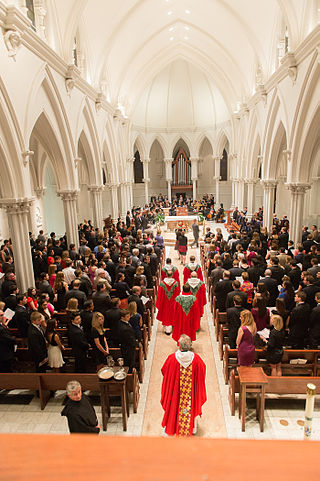
A Red Mass is a Mass celebrated annually in the Roman Catholic Church for all members of the legal profession, regardless of religious affiliation: judges, lawyers, law school professors, law students, and government officials, marking the opening of the judicial year. Through prayerful petition and thanksgiving the Red Mass requests guidance from the Holy Spirit for all who seek justice, and offers the legal community an opportunity to reflect on the power and responsibility of all in the legal profession.
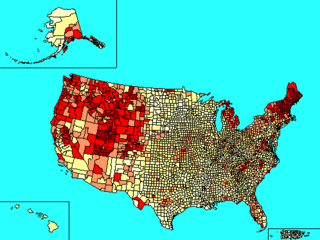
Scottish Americans or Scots Americans are Americans whose ancestry originates wholly or partly in Scotland. Scottish Americans are closely related to Scotch-Irish Americans, descendants of Ulster Scots, and communities emphasize and celebrate a common heritage. The majority of Scotch-Irish Americans originally came from Lowland Scotland and Northern England before migrating to the province of Ulster in Ireland and thence, beginning about five generations later, to North America in large numbers during the eighteenth century. The number of Scottish Americans is believed to be around 25 million, and celebrations of 'Scottishness' can be seen through Tartan Day parades, Burns Night celebrations, and Tartan Kirking ceremonies.
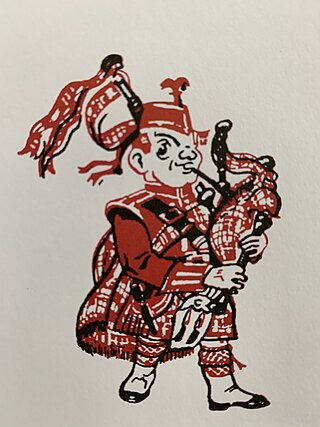
Tartanry is the stereotypical or kitsch representation of traditional Scottish culture, particularly by the emergent Scottish tourism industry in the 18th and 19th centuries, and later by the American film industry. The earliest use of the word "tartanry" itself has been traced to 1973. The phenomenon was explored in Scotch Myths, a culturally influential exhibition devised by Barbara and Murray Grigor and Peter Rush, mounted at the Crawford Centre at the University of St Andrews in the Spring of 1981. Related terms are tartanitis, Highlandism, Balmorality, Sir Walter Scottishness, tartanism, and tartan-tat.

The Holy Marriage Blessing Ceremony (축복결혼식), often abbreviated to Blessing, is a large-scale wedding, or a marriage rededication ceremony, sponsored by the Unification Church. It is given to married or engaged couples. Through it, members of the Unification Church believe that the couple is removed from the lineage of sinful humanity and engrafted into God's sinless lineage. As a result, the couple's marital relationship—and any children born after the Blessing—exist free from the consequences of original sin.
The Grandfather Mountain Highland Games is a Highland games event that has been held annually since 1956 at Grandfather Mountain, North Carolina. Celebrating the history and culture of Scots in North Carolina, it is among the first and largest modern Highland games established in the United States. Competitions and displays take place in Scottish styles of piping, drumming, costume, dance, and traditional sports.

Thanksgiving is a national holiday celebrated on various dates in October and November in the United States, Canada, Saint Lucia, Liberia, and unofficially in countries like Brazil, Germany and the Philippines. It is also observed in the Dutch town of Leiden and the Australian territory of Norfolk Island. It began as a day of giving thanks for the blessings of the harvest and of the preceding year. Various similarly named harvest festival holidays occur throughout the world during autumn. Although Thanksgiving has historical roots in religious and cultural traditions, it has long been celebrated as a secular holiday as well.

Clan Muir is a Scottish clan that is armigerous. Per certain sources, holders of the surname Muir, of Ayrshire, have been noted as a possible sept of Clan Boyd, though this is not clearly identified to a reliable resource. A spelling variation More/Moore is a sept of Clan Leslie in Aberdeenshire, and, having genetic proof of Muirs in Aberdeenshire, may have roots in the Mure/Muir line of southwest Scotland.
The Saint Andrew's Society of the State of New York is the oldest charitable institution in the state of New York and is focused on helping Scots in the New York community with the motto Charity, Fellowship, Scholarship.
Scottish New Zealanders are New Zealanders of Scottish ancestry or who originate from Scotland. The number of New Zealanders who are descended from Scots is unknown, as the New Zealand census asks for ethnicity, not ancestry, and most have now assimilated; nonetheless, the vast majority of Pākehā, or European New Zealanders are of British and Irish descent, and it has been estimated that 1-2 million New Zealanders have roots in Scotland. This includes many Māori, as a large proportion of which have European roots as well. Most Scottish New Zealanders live in New Zealand's deep southern regions of Otago and Southland, New Zealand, where they have had a substantial influence. Scottish influence on Dunedin, one of New Zealand's most historically important cities was profound, and Presbyterianism is the major religion south of Christchurch. In some parts of Otago but all of Murihiku, there is a distinct accent known as the "Southland Brrr", which differs from mainstream New Zealand English for being strongly rhotic.

Blessing of animals can be either of the animal or of the human-animal relationship, and can apply to pets and other companion animals, or to agricultural animals and working and other animals which humans depend on or interact with.
References
- ↑ "Kirkin' o' the Tartan". SaintAndrewSociety.org. St. Andrew's Society of Washington, DC. November 30, 2023. Retrieved November 24, 2023.
- 1 2 3 Wilkinson, Todd. "The Kirkin of the Tartan Tradition". ScottishTartans.org. Franklin, North Carolina: Scottish Tartans Museum. Retrieved December 8, 2023.
- ↑ "Dictionaries of the Scots Language: Search Results". DSL.ac.uk. University of Glasgow . Retrieved November 24, 2023.
- ↑ "The Kirkin' o' the Tartans". ACGAmerica.org. An Comunn Gàidhealach Ameireaganach. November 22, 2014. Retrieved December 8, 2023.
- ↑ "Kirkin' History". DuluthScots.org. Duluth Scottish Heritage Association.
- ↑ Berry, Chad (April 19, 2004). "Scottish blessing". The Tuscaloosa News. Retrieved December 14, 2023.